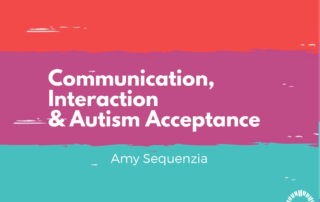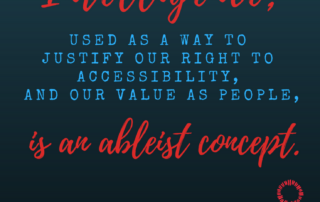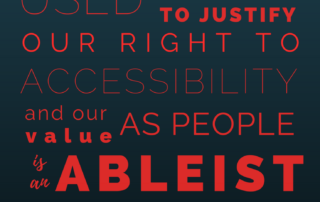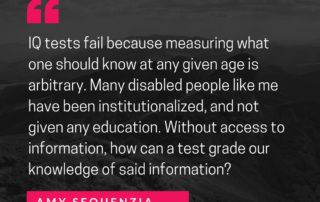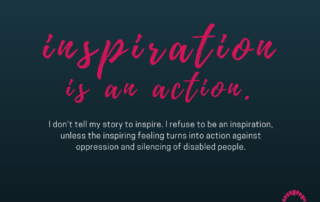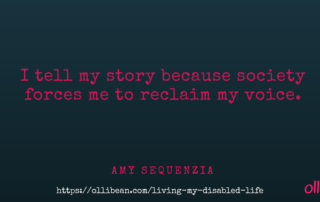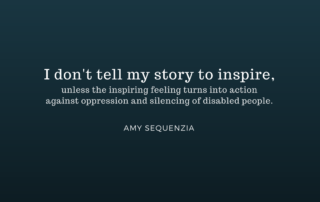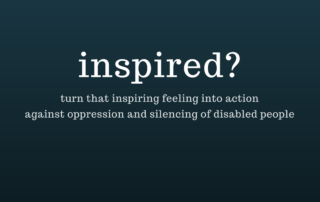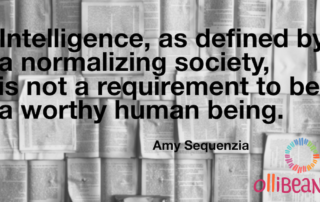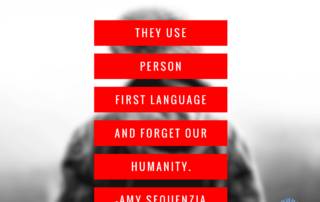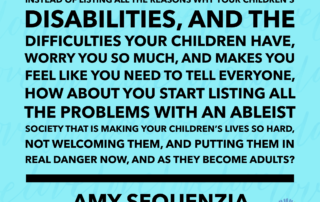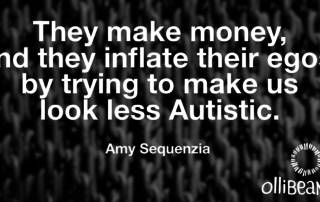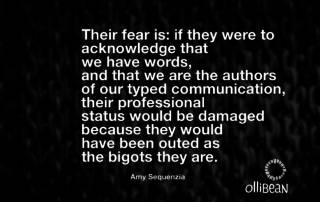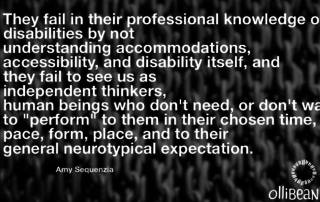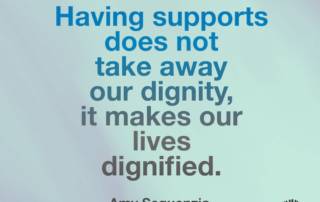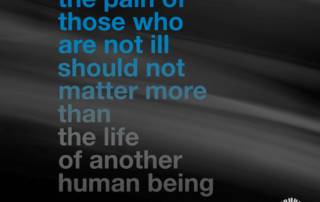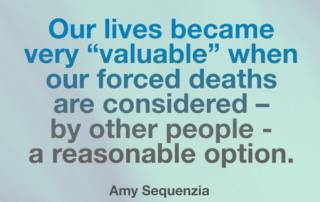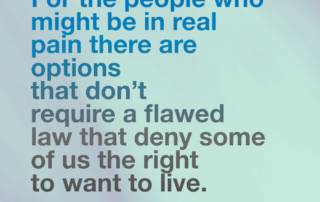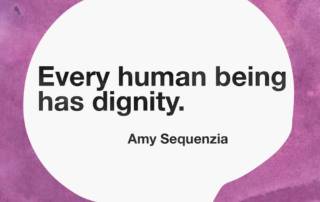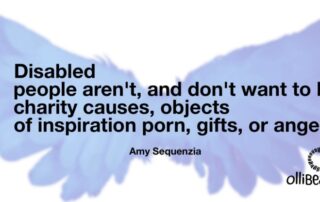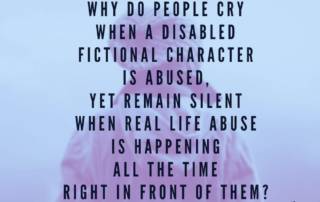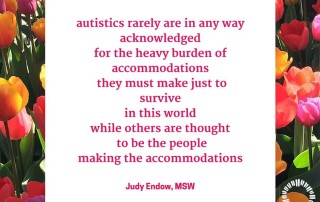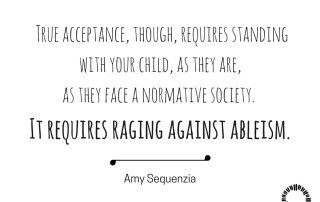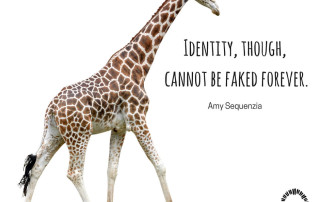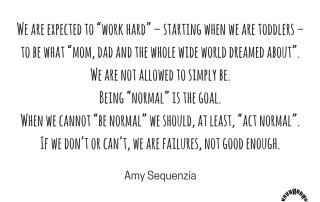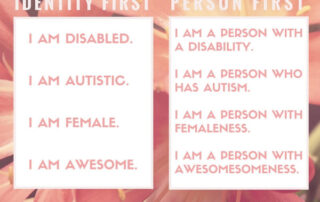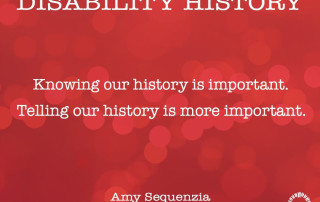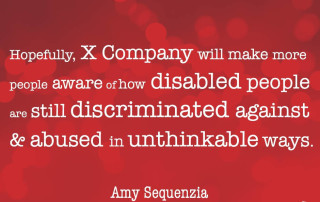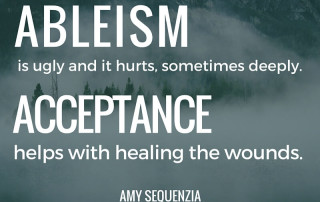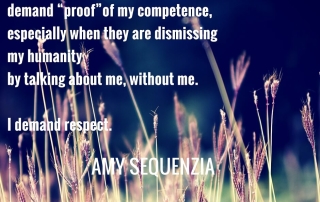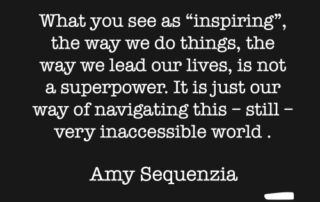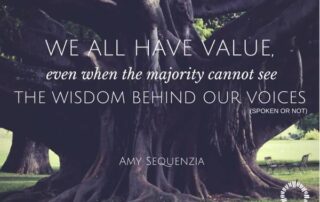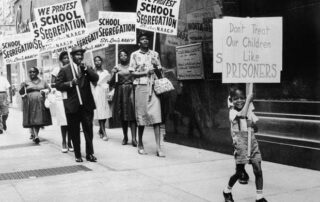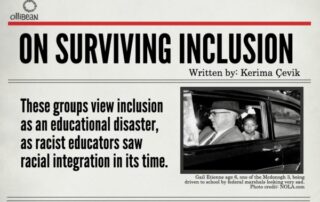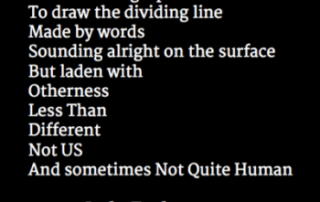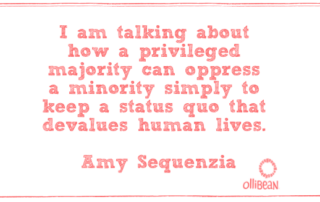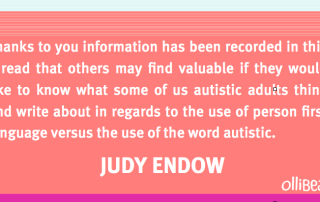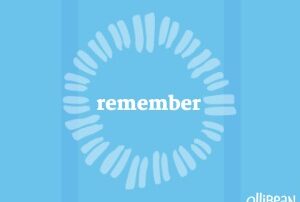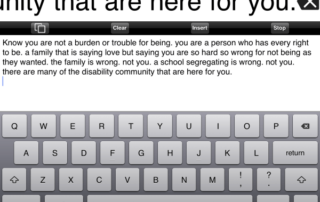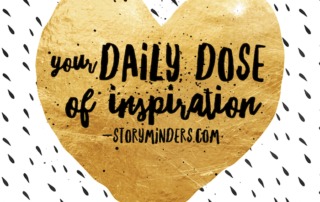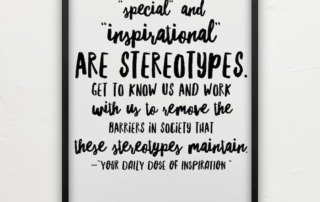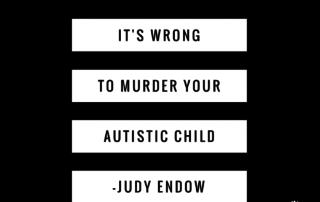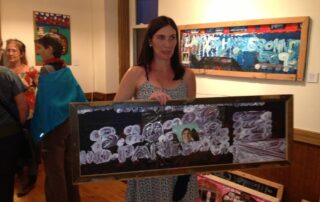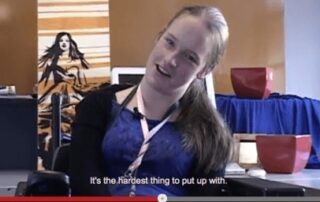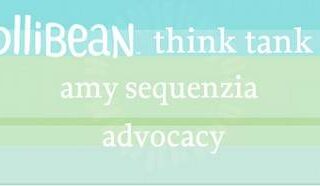Communication, Interaction, and Autism Acceptance
If you've read enough of my writings, you know that I am an activist for the rights of all people - especially Autistic people - to communicate using whatever method it works for each individual. Communication and Autism Acceptance Everybody communicates. Communication doesn't need spoken words. Communication doesn't need words at all. Behavior is communication. Smiles, looks, our bodies - those are used for communication and they are as valid as any word. I can type, and I like to type. Even if typing is exhausting, I still use this method to speak out. Interaction and Autism Acceptance But I
Intelligence Is an Ableist Concept
Intelligence Is an Ableist Concept, by Amy Sequenzia. Warning: use of the R-word. Am I “Intelligent”? Too many times I see the word "intelligence" in articles that are supposedly about disability rights. The word comes up to explain that being disabled does not mean that there is a "problem" with the brain. Many times this happens when a physically disabled person, or someone talking about physical disabilities, want to point out that “their minds are fine”. The word is also used to tell stories of non-speaking Autistics who learned to type to communicate and "proved" that they are "intelligent".
Living My Disabled Life: My Story Is Mine to Tell Part 3
How I Tell My Story by Amy Sequenzia. Living my disabled life: My Story Is Mine to Tell Part 3. (Part 1 Autism: My Story Is Mine to Tell and Part 2 Love, Respect and “Autism Parents” ) By living my life. Unapologetically. Fiercely. With pride. I am me. I am disabled and I am a perfect being, despite the bias and oppression imposed on me. I am a perfect being despite my human flaws. My story is mine. The life I live is the one I have. I like my life. I don’t like what non-disabled people believe my life to
Toxic Autism Awareness
Toxic autism awareness - sorting out autism fact from autism fiction Judy Endow Autism Fact or Autism Fiction During the past week I have run into two different people in my personal life who have expressed erroneous beliefs about autism. Both people knew that besides being autistic myself, I am a therapist in the field of autism, have written many books and numerous blogs on various autism topics, and consult and speak internationally. Without a doubt, these people knew that I know about autism. And even so, they presumed their comments to be accepted fact so much so that they
Autistic, Non-Speaking, and “Intelligent”
Autistic, Non-Speaking, and "Intelligent" by Amy Sequenzia "Being Autistic is not the same as being intellectually disabled". "Non-speaking Autistics are intelligent". "When non-speaking Autistics learn how to type they can ‘prove’ their intelligence'". All the statements above are true. They are also incomplete. Statements like these are assumptions that do not help in making the world more respectful of all disabled people. They are incomplete because some non-speaking Autistics might also be intellectually disabled; Because some Autistic people might be Autistic AND intellectually disabled; Because while some typists are able to show that the assumptions about their IQ were
The Gymnastics of Person First Language
by Amy Sequenzia This post is about Person First Language and autism. Another title for this post could be: "Disability Language, and "Gymnastics". Some might find part of it funny, but I am not kidding. I wrote about why I believe Person First Language (PFL) is ableist, and how individual choices should be respected - the "individual" being the disabled person. Person First Language and Autism Most independent-thinking Autistic adults prefer Identity First Language (IFL). Some use Person First Language and their choice should be respected. This post is directed to non-autistics, to the media, and to autism advocacy organizations
Disability, Safety, and Value
Disability, Safety, and Value by Amy Sequenzia This post will mention the attitude of some parents. This post is not about love or wanting the best for a child. It is about being conscious that ableism exists, and that you might be, even if unwillingly, contributing to the systemic ableism in our society (I urge you to read the links. Click on the highlighted words throughout the post). I am a very disabled non-speaking Autistic woman. I need many supports. Many of you already know that. Some of you also know that the supports I needed throughout my life weren't
Communication and “Autism Specialists”
by Amy Sequenzia From time to time I find myself writing about typed communication, and how Autistic typists are devalued by "autism specialists". There is a very vocal group of people - the "autism experts" or “autism specialists” - who refuse to accept that we can feel human feelings, that we can think complex thoughts, that we are people. "Autism Experts" and "Autism Specialists” Many, if not most of them are behaviorists, the ones who believe that everyone should strive to look as neurotypical as possible, and act as neurotypical as possible to have any value as human beings. They refuse
Disability, Dignity and Cost
Disability, Dignity and "Cost" by Amy Sequenzia Warning: I am going to mention "Right to Die With Dignity" legislation, my position, and other non black-and-white issues. I am against legislation that states the "dignity" of a terminally ill person should be a reason for euthanasia. I am not going to say that each person does not have the right to refuse treatment when all medical options have been exhausted and they will not survive the illness. Some illnesses, when the end is near, can be very painful. That's why I don't support legislation allowing euthanasia. Pain management is an option.
Disabled TV Character and Positive Outcomes
One Person At A Time I wrote about this before but I want to emphasize a few points. I am talking about the effect of television, or any media, on how disabilities, and disabled people, are perceived by the non-disabled world. Specifically, I want to emphasize the - hopefully - positive effects of one TV show on its fans' views on disability and disabled lives. The show is X Company and this article contains spoilers. I will talk, again, about the character "Ulli". Quick recap: Ulli was a young boy with Down Syndrome, being kept as a secret by his
Why Disabled People Write About Ableism
Are You Paying Attention When Disabled People Write about Ableism? When I, and other disabled people write about ableism, we don't do it because we like the topic. We do it because we DON’T like it but experience it every day. We do it because we are protesting the many ways we are objectified, dismissed, ignored and dehumanized. I don't speak for all disabled people but I believe most would agree with my statement above. Forms of Ableism There are very obvious forms of ableism, from inaccessibility, to inspiration porn, to denial of rights. There is also the ableism
Autism, Accommodation and Differential Expectations
People generally are very pleased with themselves when they have made an accommodation for me. I know this because they proudly announce it! In turn, I have learned to say thank you when people announce their thoughtfulness at making an accommodation for me. I truly am thankful because it allows me a fuller participation in the events going on around me. It also makes me smile because I have been making accommodations for people my whole life and it has never occurred to me to announce it!
Normalcy is an Ableist Concept
by Amy Sequenzia Ableism: we know it is everywhere and we know it is the reason why disabled people fight the normative society that chooses to make us invisible. The idea that we should try to fit a pre-determined, arbitrary way of doing things excludes disabled people by default. We are often ignored, many times abused, used as props for inspiration porn, and generally left out - unless we change how we do things, unless non-disabled people feel at least a little comfortable in our presence. Despite laws and general common sense, any accommodations necessary to make a little
Person First Language and Ableism
by Amy Sequenzia If you are not Disabled and you are demanding the use of Person First Language (PFL), you are being ableist. If you are Disabled and you are demanding that other Disabled people use Person First Language, you are being ableist. If you are Disabled and want to use Person First Language when referring to yourself, I will respect that. I will also respect your right to demand that other people use Person First Language when referring to you. But the Person First Language concept is ableist, and I can tell you why. I do know the
Disability History and Pop Culture
X Company is respectfully educating viewers about the ableism, discrimination and elimination of disabled people during the war. Hopefully, it will make more people aware of how disabled people are still discriminated against and abused in unthinkable ways.
Disability, Ableism, and Assumptions
by Amy Sequenzia The title of this article probably isn't about what you think it is. This title refers to a couple of events that made me think about how we should never assume that ableism is something pervasive only in non-disabled circles. I am talking about more than internalized ableism, the need some disabled people have to distance themselves from disabled people they consider not worthy of any respect. I am talking about ableism that easily resembles, sometimes becomes, hate. I recently experienced this kind of ableism. It was hurtful, and it got worse than I described in
Bigots
Bigots don’t have to right to demand “proof” of my competence, especially when they are dismissing my humanity by talking about me, without me. I demand respect.
Disabled Lives and Respect
I thought I wouldn't write about this case . I've been following it and the developments have been a sad reminder that disabled people are, in 2015, still seen, talked about and treated as less than human. Emily Brooks has been writing about it and her analysis is so comprehensive, I don't have much to add. But the rhetoric used by people involved in the case is making my heart hurt. If you don't know about it, you can read the articles linked above and here . I will not talk about Anna Stubblefield, if she raped an adult
Assumptions and Ableism
I've recently read an article about how some researches are slowly starting to debunk long held assumptions about autism, Autistics, functioning labels, and how the world needs to provide more appropriate education to “all” Autistics. This is a quote from a researcher (Laurent Mottron): "Early childhood interventions should focus on harnessing strengths, rather than erasing the difference between autistic children and neurotypical kids" Of course, Actually Autistic people have been saying this forever. We have been warning parents about the damages caused by "therapies" that seek to train Autistics to make us look "indistinguishable from our peers” for a long
Surviving Inclusion: At The Intersection of Minority, Disability and Resegregation
Kerima Çevik on Surviving Inclusion: At The Intersection of Minority, Disability and Resegregation “I see the work of inclusion as probably the last frontier of desegregation. If you read the brief from Brown v Board of Ed, The board of education argued that if we let the blacks be integrated then the next thing you know is that we’ll be letting people with disabilities be integrated.” Joe Petner, Principal, The Haggerty School, Including Samuel NAACP picketing St. Louis schools circa 1950s. Photo credit AARP In October of 2008, we discovered that our son, who was transferred into a full special education
Ableism and Pity. Reject Them, Be Awesome
I have written about how I had to unlearn ableism. I have written about my uncooperative body. I always state how generally happy I am, and that I am comfortable being me. All this is true but frustration shows up, and grows, every time I meet ableism. I meet ableism a lot. Ableism brought forth by pity. Pity directed at me by people who seem to believe I am “trapped” inside my body, that I suffer, or that my life is so hard, they can’t understand how I can even have goals and aspirations.
On Surviving Inclusion
On Surviving Inclusion by Kerima Cevik Three young Black soldiers, bubbling over with the news that the Civil Rights act was just signed into law, and ready to demand a front door entrance and equal treatment everywhere rushed around places where people of color were formerly unseen and unheard. Image is of the first page of the Civil Rights Act of 1964. Credit National Archives. I cannot impart on you what this moment in time meant to them. Imagine being told all your life that you were less than others. Imagine approaching your local supermarket
The Reason I Blog
This blog (The Autism Wars), and all the other blogs and projects associated with it, are for my autistic son, Mustafa. But this blog is actually not talking about him without him or about daily life with him with some rare exceptions for times when his daily displays of empathy, kindness, and love towards me move me to write. When I say it is for my son, I mean it is part of my activism and my exploration of what it means to try and ally myself to his cause. This cause is something that too many of us are aware of
Why I Don’t Like “Awareness”
Awareness campaigns of disabilities are only effective if they are planned and run primarily by the groups that are the subjects of the campaign. This is because such campaigns are not “awareness”, but “acceptance” campaigns. We welcome support, with focus on respect, equality and access. We don’t need “awareness” of deficits and tragic rhetoric.
Autism, Differences and Murder
Ever since the not guilty verdict in the George Zimmerman trial and more recently, after a police officer shot and killed Michael Brown, I have been and continue to be very much afraid in the pit of my stomach. The not guilty verdict and the dragging on of the no fault attitude in Michael Brown’s shooting underlines the fact that in our society it is perfectly ok to track down, shoot and kill someone perceived to be acting different. We fear people who are different from us. Differences come in many forms. If you are White then someone Black is
Attitudes – Information and Education
This is especially directed at parents, family members and all who spend a lot of time with disabled children. It also applies to adults, even if the way things happen when an adult is diagnosed or needs supports are different from how they happen with children. But we, disabled adults, also deserve to have supportive and informed people assisting us in navigating and participating in the world. When a child is diagnosed with a disability, or born disabled, it is said that parents, and family members, grieve. That's probably because the general perception of any disability is a negative one.
Attitudes – Grading People
Parents and family of disabled people should start demanding that everyone who is part of their children lives stops using functioning labels. We don’t need to be graded. We already have value.
Attitudes – Communication
Communication is not only speaking, typing, texting or signing. Communication is also being able to listen and understand, being accommodated to make interaction possible.
Attitudes – Introduction
When you are disabled there is a lot going against you. Not that disability is the worst thing someone can experience. It is not. Disability can be hard and some things can be very difficult to deal with. Some of us need medication and managing this can be difficult; some of us experience pain and this can be energy draining; others might have trouble with sensory processing; some might even need hospitalization from time to time. Different disabilities require different approaches, and different types of accommodations. What non-disabled people should remember is that we either learn how to live as
Being Disabled and in the Hospital
Being disabled and in hospitals is always scary because our lives is not valued as the lives of non-disabled. I was, in a way, lucky but the policies still need a lot of improvement.
Chalk Word Lines of Separation
Words are used in many ways Sometimes they are my friends Others sometimes use their words That sound like love and friend Extending from them To me But in reality These words only sound like love and friend But in the end the sound of them Does not ring true and good And is not of love and friend But instead these words draw lines Dividing Their group of US From my group of THEM Society says it is ok In fact it is perfectly fine And noble Even though self-serving Entirely acceptable To divide out those THEMs From USes
A Message to Suzanne Wright and Autism Speaks
I will soon write about posAutive messages but I had to write this first. I know my rights and I will fight against oppression at the same time that I spread the messages of acceptance and respect.
Assigned Friends Outcome
I was taught to say, “Thank you for being my friend.” So I say it. I was told to smile like I mean it. So I smile. I know I am supposed to feel grateful That you are my friend That you took the class On how to be a peer mentor to me – The good friends way – A pal for six weeks You have been defined You are a good person For giving up your spot At the popular kids’ lunch table To earn the community service hours You need for graduation By eating lunch with me,
How to Figure Out If an Autistic Needs Fixing
I have autism. I am autistic. Both these statements describe me and both are true. However, these two statements are NOT equal.
The Scarlet A: Why I Don’t Want My ID to Broadcast My Autism
A few days ago I read the article 'Law Allowing Autism to be Listed on IDs Moves Through Legislature'.
Walk In My Shoes
I want you to walk in my shoes Not because I want you to feel what it means To be disabled But because I want you to understand How it feels to be excluded I would like to see you walk in my shoes Not because I need your pity I don’t need it I don’t want it I want you to experience The uselessness of feeling pity for others Like me I would like to see you walk in my shoes And experience what I feel When my rights are denied When I am silenced Ignored Mocked Bullied Abused
Are You a Bully in Sheep’s Clothing?
On Dec. 16, 2013 I wrote a blog titled “Autistics Can BE Friends” and posted the link on social media sites. Regardless of how often or how many of us autistics write about why many of us choose to call ourselves autistic many in academia and in the medical fields continue on to let us know we “should not” be doing this. I am including in this blog a public conversation I had with a Linked In reader on this matter. The entire conversation had nothing to do with the blog I had posted – only the fact that I
Remember
Between my activism and the end of the year celebrations, I want to make time to remember my brothers and sisters that can no longer smile.
Autistics Can BE Friends
Just like people in the neuro majority do not automatically understand social norms of autistics so it is that autistics do not automatically understand the social norms of the neuro majority. This is not complicated. Our different neurologies sort us out to have different norms when it comes to behaviors around friendships. As a society we seem to operate on an assumption that the social ways of the majority are the right ways. We do not think about this or talk about this. We all define the standard by a majority rules mentality. Then, anyone who deviates from this standard
Out of the Goodness of Your Heart
I have nothing against the goodness in the hearts of other people. However, I would like to explain how it feels to be on the receiving end when I am befriended out of the goodness of your heart. First of all this doesn’t a friendship make because authentic friendships are reciprocal. This means that giving and receiving go both ways. The benefits are mutual. When you befriend me out of the goodness of your heart - and then tell me so - I understand that you are assuming the role of a kind benevolent person while I am perceived as
Real Consequences
Autism Speaks has been hurting autistics for too long. We are fighting back and we are stronger. It is time to say things like they are. This post is because I feel offended by people defending hateful speech.
Helping the Poor and Disabled
Will your attitude draw circles of holiday meaningfulness where you include yourself in what already is or will your attitude draw lines that allow you to help those poor and disabled people on the other side?
A Typical Son’s mom on “the r-word” and Chuck Klosterman’s apology
Kari Wagner-Peck ,the author of A Typical Son blog, and twitter friend @atypicalson wrote a letter to find out why Chuck Klosterman , of the Ethicist used the r-word. Kari who is 'like Erma Bombeck - in that I write funny about the ordinary and not so much in that I am angry, I swear a lot, and we have a kid who has Down syndrome' wrote an eloquent, thoughtful letter to Klosterman , reached out to folks on twitter and used social media for social good. Pretty cool. You can read the response from Klosterman here,It's fabulous- CK, sincerely apologizes
This Is Autism by Amy Sequenzia
Today we are flashblogging to counter Autism Speaks’ wrong view of autism. We are showing what autism really is. We speak for ourselves, even if Autism Speaks refuses to listen. The rest of the world will.
This Is Autism by Henry Frost
Best place for all autistic people, all disabled not disabled people, all families to speak together. Speak together for acceptance, inclusion, communication, and rights for all people. I am thinking when you look closely, this is what autism is.
Don’t Call Me Inspirational
"Disability is not something terrible that needs to be fixed, cured, or made to go away forever. It is a natural part of reality. We ask for acceptance as equal members of society." From the PSA "Your Daily Dosage of Inspiration" by Cheryl Green and Caitlin Wood.
I ALREADY AM A HUMAN BEING
I do not know if you have ever thought of it this way, but it is a step up that today autistics have the opportunity extended to prove themselves human. As bad as that is and wrong in ever so many ways it is a step up from 50 years ago when I was a kid and we were not even given any chances to try to convince anybody of our worthiness as a human being much less our intelligence. It is all so wrong and such a slow moving shift it is sometimes difficult to remain positive. This past
From “Severe and Low Functioning” to “Kind of a Big Deal”
Some people consider it so abhorrent to entertain the possibility of having a child with autism they are willing to do a sperm screening that allows doctors to selectively choose only sperm that will produce female children to impregnate the mother. Since there are currently four times as many autistic boys than autistic girls the thinking is that only allowing sperm that will result in girl babies at least reduces the risk of autism. Read the article Baby Sex Checks here. There are ever so many areas to address in this article and others have done so here , and here, but
Don’t Mix Up Empathy and Civil Rights
Many times in the autism community parents of autistic children do not like autistic adults weighing in on situations that have to do with their autistic children. I am an autistic adult and often have parents telling me that I should not judge situations if I have not lived it – the “until-you-walk-a-mile-in-their-shoes” is told to me nearly every week as I post the latest news articles along with my comments on social media.
Putting Education First by That Crazy Crippled Chick
"First, we must ensure that all children, including and especially those with disabilities, receive a quality education. Inclusion means nothing if a child is not receiving a good education, which is, in fact, the very reason we have schools in the first place. " Cara Liebowitz
Dear Issy
You don't know me but I have seen your pictures. You don't know me but I know parts of your story. Soon you will wake up and a lot will have changed. You will be in a hospital because your mother did something terrible to you. I know you love your mom and things are going to be very confusing because people are going to say things that will not make sense. And you will not be able to see or talk to your mom. This is a good thing, and you will understand it later. But I don’t want
Again, We Mourn
My soul hurts and I am naming names. And I am saying, if you have a drop of sympathy for the murderers, or almost murderers, you have blood on your hands too.
IT IS WRONG TO MURDER YOUR AUTISTIC CHILD
I know how it feels to be the victim, the mother, the caregiver and the social worker. And I know this: IT IS WRONG TO MURDER YOUR AUTISTIC CHILD. It's Wrong to Murder Your Autistic Child. Issy's Story Issy Stapleton, 14, remained hospitalized in Grand Rapids, Michigan late Wednesday after her mother, Kelli Stapleton, allegedly attempted to murder her. State police Lt. Kip Belcher said two portable charcoal grills were burning inside the vehicle where Issy was found unconscious. He said the van's windows were shut and investigators believe Issy’s mother intended to murder her daughter. Assistant Prosecutor Jennifer
We Are Not In Our Own World
We need to be careful about how we think about and talk about people with disabilities. One example is the reference that those who are autistic or deaf or blind or have some sort of movement differences are “in their own world.”
Seattle Children’s Hospital Pulls Bus Ads After Community Outrage
“Autism is a disability, but it is not a disease. It is not a life-threatening illness,” said Matt Young, co-leader of ASAN-WA. “The idea it’s a state to be wiped out has much negative impact on our lives.”
Much Needed Resource: “We Are Like Your Child”
"We are like your child. Your child is like us. And we may have difficulties, we are disabled--but there is no denying that we are also awesome."
Hi @KatieCouric I am #autistic & would like to talk to you about #inclusion, #communication & #civilrights #KatieAutismChat
Katie Couric will have a Twitter Chat with Autism Speaks on Wednesday May 29th at 1pm EST . Autistic people should be in the chat. hashtag #KatieAutismChat. This is my message. Hi @katiecouric I am #autistic & would like to talk to you about #inclusion, #communication & #civilrights #KatieAutismChat .
Autistic Hoya: Ordinary Lives
When I demand equal access, equal opportunity, equal rights, I'm not insisting on my superiority, innate or acquired. I don't want special treatment. I want to see the removal of cultural paradigms about what types of bodies and minds should be valued and what types of bodies and minds should be deigned for marginalization. I don't want a world that advantages me over you. I want a world where oppressive systems that ultimately hurt everyone have been overcome, dismantled.
Autistic Hoya: Fighting ableism with ableism doesn’t work
Fighting ableism with ableism doesn't work. In fact, it's just bad policy. Yet that's precisely the tactic that Disability Scoop, "the premier source for developmental disability news," decided to use in its criticism of the latest episode of Glee, in wh
I Feel Tired
Some parents understand that autism is a natural part of some children’s lives and they fight the societal attitudes toward autistics. That’s love. Some parents don’t, and they fight, and hurt, their own children. This is not love and is one of the things that make me very tired.
‘Impaired Perceptions’ – Photographer Brian Steel Fights Ableism
"The overall message is that you cannot tell what a person is capable of or what their life is like simply by looking at them. " Brian Steel
A Child With Down Syndrome Keeps His Place at the Table
IT’S rare that our daily lives adhere to dramatic form. But as reported on Today.com/Moms (“Waiter hailed as hero after standing up for boy with Down syndrome”), among other places, a little morality play took shape a few days ago in a Houston restaurant
Advice from Someone Who Has Been There
I love Larry Bissonnette- artist and disability rights activist. If you have seen Wretches & Jabberers or My Life as an Artist, or seen Larry present- I'm sure you are right there with me. His paintings are extraordinary, his words brilliant, and his wit and personality beyond wonderful. He is an exceptional person I feel privledged to call friend. We have been lucky enough to spend a lot of time with Larry; a weekend at our home in Tampa, a week in Vermont (where we were able to visit Larry's studio and watch him create his paintings) and numerous conferences
Kuusisto on the Fraudulent Writing about Autism at Slate
Stephen Kuusisto on the ableist article about autism and neurodiversity on Slate.
No Limits: People With Cerebral Palsy v Condescending Tools
No Limits: People With Cerebral Palsy v Condescending Tools.
Grit Media
Grit Media promotes the rights and aspirations of people with disabilities by creating opportunities to be seen and heard in a range of media productions. Our productions bring disability awareness into peoples' homes through the depiction of realistic, compelling and entertaining content, that encourages audiences to see disability as a natural part of life. The organisation provides training opportunities for people with disabilities and aims to encourage the wider media industry to join our battle against a culture of harmful misconception and ignorance about disability. Welcome to Grit Media.
Social Model of Disability
Great animated short on the social model of disability. What are your thoughts?
It is About Respect
Respect for one another is one basic quality if we want to have meaningful conversations and relationships with other human beings. The ableism that disabled people experience is a form of disrespect.
Supporting Young Autistics
We hope that young autistics today will be proud of themselves and without shame. The message that boy received at that moment was the opposite of acceptance. It was ableist and it came from someone who is part of our own community.
Disability in an Ableist World
Disability as a constructed concept is not a commonly understood or propagated idea in the mainstream of an ableist society. The average non-disabled person, and frequently even disabled people who’ve had limited or no exposure to disability rights theor
Minnesota Gov’s Council on Dev. Disabilities: Organ Transplants
The Minnesota Governor's Council on Developmental Disabilities Lives Worth Saving: Organ Transplantation and People with Disabilities In 1995, Sandra Jensen was denied a heart/lung transplant. The transplant had been recommended by her attending physician. It was the only way to save her life. The transplant had even been approved by her insurer, MediCal. The problem - two California transplant centers refused to save Sandra's life.The good news - Sandra got her heart and lung transplant. She was the first person with Down Syndrome in the world to do so. With the help of friends and supporters, Sandra attracted national

